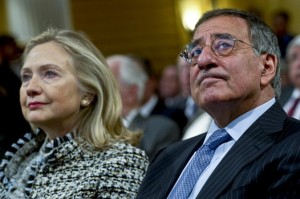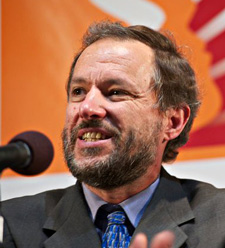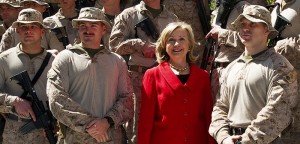Archive for July, 2016
Hillary Clinton and Her Hawks
By Gareth Porter
Focusing on domestic issues, Hillary Clinton’s acceptance speech sidestepped the deep concerns anti-war Democrats have about her hawkish foreign policy, which is already taking shape in the shadows, reports Gareth Porter.
As Hillary Clinton begins her final charge for the White House, her advisers are already recommending air strikes and other new military measures against the Assad regime in Syria.
The clear signals of Clinton’s readiness to go to war appears to be aimed at influencing the course of the war in Syria as well as U.S. policy over the remaining six months of the Obama administration. (She also may be hoping to corral the votes of Republican neoconservatives concerned about Donald Trump’s “America First” foreign policy.)
Last month, the think tank run by Michele Flournoy, the former Defense Department official considered to be most likely to be Clinton’s choice to be Secretary of Defense, explicitly called for “limited military strikes” against the Assad regime.
And earlier this month Leon Panetta, former Defense Secretary and CIA Director, who has been advising candidate Clinton, declared in an interview that the next president would have to increase the number of Special Forces and carry out air strikes to help “moderate” groups against President Bashal al-Assad. (When Panetta gave a belligerent speech at the Democratic National Convention on Wednesday night, he was interrupted by chants from the delegates on the floor of “no more war!”
 Defense Secretary Leon Panetta with Secretary of State Hillary Clinton at NATO conference in Munich, Germany, Feb. 4 (Official Defense Department photo)
Defense Secretary Leon Panetta with Secretary of State Hillary Clinton at NATO conference in Munich, Germany, Feb. 4 (Official Defense Department photo)
Flournoy co-founded the Center for New American Security (CNAS) in 2007 to promote support for U.S. war policies in Iraq and Afghanistan, and then became Under Secretary of Defense for Policy in the Obama administration in 2009.
Flournoy left her Pentagon position in 2012 and returned to CNAS as Chief Executive Officer. She has been described by ultimate insider journalist David Ignatius of the Washington Post, as being on a “short, short list” for the job Secretary of Defense in a Clinton administration.
The – sad – US nominations
By Johan Galtung
The US mountain, so rich in human talent, labored and produced the two dwarfs for the huge job. A radical Republican strongman[i] and a conventional Democrat, disliked by 62% and 67%–bad for electing the president of a country that still puts some stamp on the world.
Trump challenged, successfully, the Republican machine. The Democratic machine got a Hillary who challenged absolutely nothing. In both parties, in the name of unity, a veil was drawn over these basic US conflicts today, not between the parties, but within. Cruz did not give in, Sanders did–maybe bribed by some verbal rephrasing.
Take the issue-complex “foreign policy-war”.
An isolationist Trump could save American lives” (and many more non-American lives). But doing so to save money is not good enough; take the issues head on. “Clinton and Trump jostle for a position over North Korea” is more to the point: Trump is open to negotiate directly with Kim Jung-un, Hillary sticks to conventional isolation-sanctions-multilateralism. Trump might become the first US president to take North Korea on the word: “peace treaty-normalization-a nuclear-free Korean peninsula”. Hillary’s line leads nowhere.
What is missing is an open debate on the two untouchables: US foreign policy and the US right and duty to war.
So there they are… Continue reading here.
Comment from Birgitta Hambraeus:
”To the point as usual, Johan! I appreciate your analysis!
What do you think will happen to Nato if Trump is elected president?”
Varma hälsningar!
Birgitta
TFF PressInfo # 384: The Clintons celebrated – but likely disastrous for the world
By Jan Oberg
Hillary Rodham Clinton was nominated last night by the Democratic Party as its candidate for the U.S. Presidency. She may well win on November 8.
What a tragedy for Western democracy that the leader of what is still called the free, democratic world cannot produce better candidates than Trump and Clinton through a disgustingly commercialized and corrupt political process where candidates like Jill Stein – did you ever hear of that candidate? – doesn’t have a chance because she cannot mobilize the funds.
As a European intellectual with a life-long commitment to peace and democracy, I find little reason to celebrate.
And why the total focus on a few individuals at the top but not the structures that will run them both, such as the Military-Industrial-Media-Academic Complex (MIMAC); the cancer in many societies, including Russia, that President Eisenhower warned the world about in his farewell speech already in 1961?
How short the media memory! Hillary Clinton’s nomination celebrated all over the mainstream press as a victory for the party – preventing it from splitting – and for all women.
But how can people – women in particular – really believe in such genderism: that she will be a better president for the US and the world because she’s a woman? Hasn’t the world learnt anything from the inverse racism:that Obama would be a great president because he is black?
How blind the media to militarism, war and other violence: Not one media focuses on the Clinton’s well-documented fascination with violence and war.
It’s time to refresh the memory of the Clintons:
Bill Clinton’s record
From 1994 BC broke all promises made by his predecessors and other Western politician to Gorbachev about “not expanding NATO an inch”. He started out in Tblisi, Georgia. I happened to be there, spoke with the U.S. representative to the country and got a sense what was coming. Later too in Yugoslavia.
There is a straight line from that fatal arrogance to today’s Second Cold War in Europe, Ukraine having – predictably – to be the this-far-and-no-longer country of that mindless and reckless expansion that should never have happened.
BC’s interventionist record is also forgotten: He bombed in Afghanistan, Sudan, Iraq, Bosnia, Kosovo and Serbia – the latter much much worse from any point of view than the Russian annexation of Crimea. It was based on the fake Rambouillet “talks” between Serbs and Kosovo-Albanians, his public lies about there being an ethnic cleansing of all Albanians in Kosovo coming from Slobodan Milosevic whom he called a new Hitler.
No such plan was ever found – and I know a bit about it because I was a goodwill adviser both to three governments in Belgrade and to the non-violent Kosovo-Albanian leadership under Ibrahim Rugova.
It was Clinton’s Secretary of State, Madeleine Albright, who masterminded much of it and is on record for saying that it was politically justifiable that the sanctions on Iraq had killed 500.000 innocent people. And they continued.
And she, having survived as a refugee child in Belgrade, Serbia, with her Czechoslovakian family during the Second World War and spoke Serbian is on record for hatred of the Serb people.
Conveniently, the West has forgotten it all. BC is such a charming man (who just told us at the reality show-like democratic convention how much he loves his wife).
His administration was one of the most militarist.
Hillary Clinton’s record
There is no excuse for having forgotten her record. GFrom 2009 to 2013, she served as Secretary of State under Obama, the US president who has been engaged in warfare during more days than any other US President according to the New York Times.
HC has supported all the wars she could and she was a mastermind of the war in Libya. One remembers the film clip showing her happiness at Khadafi’s death.
She is a Cold Warrior, anti-Russia, anti-Putin Russians will be great for fighting Putin.
Her war-promoting record is as long as it is well-documented.
The most solid documentation is that of professor Stephen Zunes. Read the rest of this entry »
Hillary The Hawk
The most comprehensive documentation of Hillary Clinton’s systematic support for military action and of her deceptive talk, if not lies.
From The Cairo Review of Global Affairs




